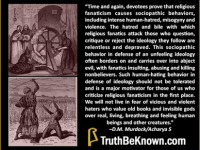 I have found that one needs to become extremely serious and dedicated in their spiritual search and walk. We need to use our brains and think things through, weigh up the facts and research, research and research some more.
I have found that one needs to become extremely serious and dedicated in their spiritual search and walk. We need to use our brains and think things through, weigh up the facts and research, research and research some more.
Prayer, knowledge, wisdom, understanding, research and study are critical. Hosea 4:6 says: “My people are destroyed for lack of knowledge: because thou hast rejected knowledge, I will also reject thee, that thou shalt be no priest to me: seeing thou hast forgotten the law of thy God, I will also forget thy children”. And do not forget Jeremiah 16:19 “………….Surely our fathers have inherited lies, vanity, and things wherein there is no profit”.
It doesn’t look good then for all those who just bounce up and down in church, clapping hands, singing and dancing but who lack knowledge about their Creator. Moslems and Jews also seem to be lacking the necessary knowledge. In the three Abrahamic religions doctrine and the ideas of men seem to have replaced facts. It is clear then that your future and that of your children are not looking good! Please don’t stop reading Part 7 at this point. The following will enlighten you enormously!
The evidence for the statements below is overwhelming. The following paragraphs tell the facts extremely well, they are taken from:
http://www.nigerianmuse.com/20071224100242zg/nm-projects/christianity-projects/does-olorun-olodumare-mean-god-in-english-language/
The derivation of the word ‘God’ is traceable to old English/Germanic god (guþ, gudis in Gothic, Gott in modern German). The original meaning and etymology of the Germanic word god is somehow disputable, however most agree to a reconstructed Proto-Indo-European form. The form is hutóm, which is a passive perfect participle from the root of hu-, which expectedly meant “libation”, “sacrifice”. Putting side by side, we have: –
• Vedic Sanskrit hu- = “to sacrifice”.
• Greek khu-, kheu- = “to pour”.
• Common Germanic strong verb geutan (Anglo-Saxon geotan) = “to pour”, English in-got.
Expectedly, the connection between these meanings is through the meaning “pour a libation”. Another potential meaning of hutóm is “invocation”, related to Sanskrit huta.
The word God was used to represent Greek theos, Latin deus in Bible translations, first in the Gothic translation of the New Testament by Ulfilas.
In the aspect of the science of language, especially, historically and comparatively, Greek theos is said to be associated to Zeus, the chief god in Greek mythology, who has Deus in a genitive form. Latin Diespiter means Jupiter, major god in Latin mythology, dies + pater, day + father. In Sanskrit. deva is a god, as derived from the root div, heaven, and dui denoting day, shine and brightness (Lating niter). Thus, it is not out of place to say god as traceable from old English/Germanic connotes “pour a libation”, an image (idol).
The Christian texts dominated the development of English conventional spelling. As a result, the capitalised “God” was first used to refer to the Judeo-Christian concept, which now signifies any monotheistic conception of God, including the translations of the Arabic Allah, Yoruba Olorun etc.
Notwithstanding, the use of capitalisation, as for a proper noun does not remove the root meaning of the word ‘god’ as traceable from old English/Germanic connoting “pour a libation”, an image (idol). It still stand that ‘God’ in Anglo-Saxon expresses “sacrifice”/”pour” (geotan) to a graven image (god – idol).
Without any iota of doubt it is obvious, and without any contradiction ‘God’ is ‘god’ and ‘god’ is ‘God’. Nevertheless, ‘God’ is use euphemistically as the concept of a singular God. In consequence, the King James Version of 1611 renders Elohim (that express the concepts of divinity – the Canaanite father god is EL. Elohim, with ending – im, is plural and masculine) as “God”. In addition, kurios ho theos as “LORD God” (in the New Testament).
Since the source of the word, ‘God’ is established and readers are now knowledgeable about the root meaning of ‘God’, traceable to old English/Germanic god; we can now turn our attention to the derivation of the ‘God’ of the Christians. To establish the source of the ‘God’ of the Christians, we cannot withhold the important rolls that historical occurrences played. Therefore, knowing about what happened as at when and why, will assist us to understand beyond reasonable doubt, regarding the derivation of the ‘God’ of the Christians.
Inside (Catholic Encyclopaedia, op. cit., pp. 656-7) it is written that “the earliest of the extant manuscripts of the Christian Scripture (The New Testament), it is true, do not date back beyond the middle of the fourth century AD”. In essence the Church (Church in this sense meant Roman Catholic Church) is telling the whole world that not less than 350 years after the time the Church claims that a Jesus Christ walked the sands of Palestine, there were no Gospels. This is to say the Gospels were progressively writing from 350 AD. The reason for quoting this extraordinary admission of the Church is to establish the period in time when the ‘God’ of the Christians came into existence. By the admission of the Church, it is clear there were no record of any kind anywhere on earth about Jesus Christ earlier than the middle of the fourth century of the Common Era (C.E.).
By 325 C.E., Constantine had been consolidating his rule of the western empire for twenty years, and within those years, he had conquered the Eastern Roman empire, now he had acquired the entire Roman Empire.
By the admission of the Church about the “conversion” and “baptism” of Emperor Constantine to be “entirely legendary” (Catholic Encyclopaedia, Farley ed., vol. xiv, pp. 370-1), it is inferable, there was no Christian religion at Constantine’s time.
There were clusters of presbyters that had developed different gods in the whole Roman Empire. Eusebius Pamphilus of Caesarea wrote that “Constantine noted that among the Presbyterian factions “strife had grown so serious, vigorous action was necessary to establish a more religious state”, but he could not bring about a settlement between rival god factions (Life of Constantine, op. cit., pp. 26-8)”. Further, Eusebius Pamphilus said his advisers warned him that the presbyters’ religions were “destitute of foundation” and needed official stabilisation (ibid.). As a result, the need for a new and State endorsed religion was in order. The Emperor, himself was initiated member of the religious order of Sol Invictus, a cult that regarded the Sun as the one and only ‘Supreme God’. So, it is not by accident that Christians worshiped on Sunday, the very day that Sol Invictus followers worshiped the Sun God. Now, to establish State endorsed Religion, the Emperor commanded all presbyters and their subordinates to the city of Nicaea.
What is known today, as Council of Nicaea was the first ecclesiastical gathering in the Church history. Emperor Constantine summoned attendees to the Council of Nicaea in June 21, 325 C.E.(AD). The summoned presbyters and their subordinates were instructed to bring along their written arguments. The total written arguments were “two thousand two hundred and thirty-one scrolls and legendary tales of gods and saviours, together with a record of the doctrines orated by them” (Life of Constantine, op. cit., vol. ii, p. 73; N&PNF, op. cit., vol. i, p. 518). From available record by a one-time Bishop of Llandaff in Wales (1782), namely Dr Richard Watson there were a total of 318, comprising “bishops, priests, deacons, subdeacons, acolytes and exorcists”. All gathered to debate and decide upon a unified belief system that encompassed only one god. (An Apology for Christianity, 1776, 1796 reprint; also, Theological Tracts, Dr Richard Watson, “On Councils” entry, vol. 2, London, 1786, revised reprint 1791).
Julius Caesar was deified by the Roman Senate after his death (15 March 44 BC) and subsequently venerated as “the Divine Julius”. The word “Saviour” was affixed to his name, its literal meaning being “one who sows the seed”, i.e., he was a phallic god. Julius Caesar was hailed as “God made manifest and universal Saviour of human life”, and his successor Augustus was called the “ancestral God and Saviour of the whole human race” (Man and his Gods, Homer Smith, Little, Brown & Co., Boston, 1952). Emperor Nero (54-68), whose original name was Lucius Domitius Ahenobarbus (37-68), was immortalised on his coins as the “Saviour of mankind” (ibid.). The Divine Julius as Roman Saviour and “Father of the Empire” was considered “God” among the Roman masses for more than 300 years. He was the deity in some Western presbyters’ texts, but was not recognised in Eastern or Oriental writings. (Extracted from Nexus Magazine, Volume 14, Number 4 (June – July 2007)). This information is given so that all can know that the words “Saviour”, “God made manifest”, and “Saviour of mankind” preceded Christianity. In other words, Christianity expropriates the words those were affixed to deify Julius Caesar and immortalised Emperor Nero; as affix to their ‘God’.
The motive of Constantine was to establish State endorsed Religion, a new Religion that was in his eyes that will be a social reform, which the empire needed at that time. This new Religion is to give birth to new ‘god’ for his empire that would unite all religious factions under one deity. The attendees argued among themselves, each advancing arguments that will of course favour their own special deity. Overall, 53 gods were tabled for discussion. “As yet, no God had been selected by the council, and so they balloted in order to determine that matter… For one year and five months the balloting lasted…” (God’s Book of Eskra, Prof. S. L. MacGuire’s translation, Salisbury, 1922, chapter xlviii, paragraphs 36, 41).
The record of proceedings at the gathering of the presbyters indicated that over seventeen months of heated debate produced no consensus on a new deity. However, by balloting, the presbyters had succeed eliminating 48 gods out of the 53 gods that were tabled for discussion, by the time Constantine returned to Nicaea. The five short listed prospects were: Caesar, Krishna, Mithra, Horus and Zeus (Historia Ecclesiastical, Eusebius, c. 325).
For the purpose of fusing together the two geographical regions of the empire, namely Western Roman Empire and Eastern Roman Empire, religious wise, Constantine ruled that the name of the great Druid/Gaul god – the Respected One, Hesus (Esus), be joined with the Eastern Saviour-god, Krishna (Krishna is Sanskrit for Christ). This god Esus, Hesus was first mentioned in a classical writing of a Roman poet, Lucan, (M. Annaeus Lucanus) in the first book of his Pharsalia, dating from the first c. AD, the last great battle in the civil war between Pompey and Caesar (Pharsalia I, 444-6). Lucan stressed that the god was worshipped with human sacrifice, and that it was apparently more or less well-known local god, among other gods.
Through voting by the 318 attendees, by the show of hands, the majority elected that the Respected One, Hesus and Saviour-god, Krishna became one ‘God’. In consequence, by Roman deification decree, Constantine legally deified two deities as one, through democratic consent. A new god was proclaimed and “officially” ratified by Constantine (Acta Concilii Nicaeni, 1618). In so doing, the official name for the new Roman god is Hesus Krishna, which subsequently evolved into “Jesus Christ”, when by the ninth century the letter “J” was now in the alphabets.
In 1711, a stone pillar was discovered buried under the choir of the Notre Dame cathedral in Paris. It depicts the “pagan god”, “Esus”, cutting branches from a tree. “Esus”, is the variant of the name “Jesus”. This pillar is dated to around the time of Christ. In Spanish Jesus is pronounced Hesus.
The doctrine of the Incarnation lies at the heart of the Christian religion (to be incarnate means to have a body of flesh). In John Chapter 1: 1-2 and 14 we read: In the beginning was the Word, and the Word was with God, and the Word was God. (2) The same was in the beginning with God. (14) And the Word was made flesh, and dwelt among us, (and we beheld his glory, the glory as of the only begotten of the Father,) full of grace and truth.
The pagan “logos” was Christianise, to be the ‘WORD’. The Catholic Encyclopaedia says: “Always the Church has {134} forcefully moulded words, and even concepts (as Saviour, Epiphany, Baptism, Illumination, Mysteries, Logos,) to suit her own Dogma and its expression. It was thus that John could take the expression ‘Logos,’ mould it to his Dogma, cut short all perilous speculation among Christians, and assert once for all that the ‘Word was made Flesh’ and was Jesus Christ.” (CE. xi, 392.).
We have now positively and convincingly substantiated the Pagan source of the ‘Christ’, to be the Pagan Myth, -the old Greek “Logos” of a Greek philosopher. The invention of the ‘Logos’ doctrine was credit to a Greek philosopher Heraclitus, who lived 535-475 before ‘Christ’, and had never heard of ‘Christ’. In addition, as they say the rest is history”.






Wow. This is HUGE.